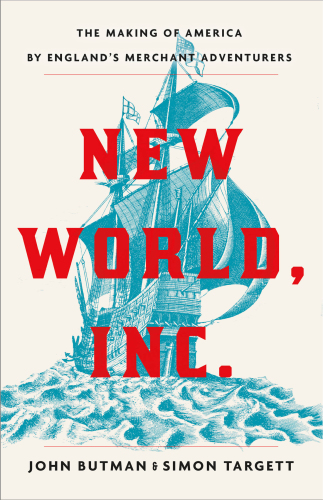
New World, Inc.
The Making of America by England's Merchant Adventurers
کتاب های مرتبط
- اطلاعات
- نقد و بررسی
- دیدگاه کاربران
نقد و بررسی

January 1, 2018
On May 20, 1553, three ships chartered by an English joint-stock company called the Mysterie set off down the Thames from London in search of “Regions, Dominions, Islands, and Places Unknown.” The Mysterie ships sought a northern passage to the riches of Cathay, or China. They never found it—but, as business writer Butman (Breaking Out) and journalist Targett explain, their voyage inaugurated a new age of English seafaring propelled by the twin currents of trading profit and entrepreneurial zeal. The authors portray these 16th-century English merchant adventurers as the real founders of the New World, enterprising men whose appetite for risk made them a natural fit for their tempestuous times and whose critical role in the American story was erased in favor of the pious pilgrims. Butman and Targett are fluent storytellers with an eye for detail, but their rewriting of the age of exploration as a straightforward paean to modern-day capitalism is problematic; the story they tell isolates the motives of a handful of men from the wider context of the early Atlantic economy. Agent: Katherine Flynn, Kneerim & Williams.

January 15, 2018
A search for profits and new markets spurred England's exploration of North America.Business journalists and historians Butman (Breaking Out: How to Build Influence in a World of Competing Ideas, 2013, etc.) and Targett argue persuasively that the myth of America's founding narrative, centered on the Pilgrims' quest for religious freedom, ignores the reality of England's relationship to the New World in the 16th century. For the English, settlements offered both a market for manufactured goods--especially woolen cloth, on which the economy was largely based--and a source of coveted raw materials, notably fur, wood, and precious metals. America's origin was not "a fable of moral rectitude and national goodness" but rather the culmination of decades of business deals. Jobs, the authors reveal, were the Pilgrims' "key concern." Drawing on considerable primary sources, the authors chronicle the investment groups--beginning with the Company of Merchant Adventurers, in 1552--who gathered shareholders to fund expeditions to foster trade. The Merchant Adventurers at first focused on trade with Russia and finding a northern route to China. That focus shifted after explorers Martin Frobisher and Francis Drake returned to England in the late 1570s with reports of vast western lands and a possible route to China through the Northwest Passage. In a nation mired in debt and economic problems, the lure of land grants appealed to investors large and small: merchants, artisans, shopkeepers, and soldiers. Nevertheless, with most investors contributing from 5 to 50 pounds, it proved difficult to fund a fleet of several ships and hundreds of men. Storms, disease, navigation errors, and rivalries undermined many voyages. Still, reports of successes "gave England a new way to think about itself--no longer as a sluggish and neglectful nation but as a bold seafaring people." The authors give ample evidence that "the driving commercial impulse, the spirit of enterprise" underlay the creation of America. As John Smith wrote in 1616, no "other motive than wealth will ever erect there a Commonweale."A lively and illuminating revisionist history.
COPYRIGHT(2018) Kirkus Reviews, ALL RIGHTS RESERVED.

October 15, 2017
In the mid-1500s, when England was a minor country seeking to expand its trade, merchants got together to form the world's first joint-stock company. The rest was empire building. With a 75,000-copy first printing.
Copyright 2017 Library Journal, LLC Used with permission.

Starred review from February 1, 2018
During the mid-15th-century, England was in economic, political, and social crisis. By 1552, English courtiers, merchants, adventurers, and financiers began planning innovative, costly, and perilous expeditions to expand trade to Asia and America in order to rival Spain, make England commercially self-sufficient, and save it from social decay. They sought new trading outposts; sources of spices, goods, and precious metals through new routes. Soon, they marketed the idea to establish a North American colony for commercial purposes, and as a safety valve, providing space and employment for criminals and the impoverished. Some ventures were moderately successful; others, tragic failures, but each was a learning experience for adventurers in pursuit of immediate wealth, who learned to consider the enduring hardships involved in establishing a new outpost or a sustainable colony. Butman (Breaking Out) and journalist Targett draw from a wealth of archival resources to argue convincingly that the commercial motive was key to English expansion into the New World. They successfully quash the 19th-century myth, manufactured by antislavery New Englanders, that virtuous, religious-freedom-seeking Puritans, not Southern slave-holding Virginians, were the real founders of the American Dream. VERDICT This engrossing history of adventure and innovation, disclosing the true motive for America's founding, will appeal to all readers.--Margaret Kappanadze, Elmira Coll. Lib., NY
Copyright 2018 Library Journal, LLC Used with permission.

























دیدگاه کاربران